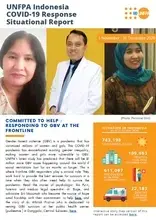
The participants of the Youth Training on ASRH in Humanitarian Settings with UNFPA Representative, Mr. Jose Ferraris
Bogor, 30 April 2015 - Indonesia is prone to strong earthquakes, tsunami, floods, mudflow and landslides. On 26 December 2004, Banda Aceh City, other parts of the Aceh province and small outlying islands of Sumatra suffered from a 9.1 magnitude Indian Ocean earthquake which resulted in a tsunami, killing around 225,000 people.
There was a large scale domestic and international response to the tsunami, and the Government of Indonesia, along with international organizations, have implemented disaster management plans ready to respond to any future disasters. However adolescents and youth (aged 15 to 24) are often overlooked during these humanitarian responses. In the aftermath of natural and human-made calamities, these population segments are usually at risk from sexual and gender-based violence, early marriage, sex work and exposure to STIs and HIV.
Ensuring young people’s rights, security and well-being is central to Indonesia’s development programme. UNFPA is committed to maintaining its commitment to young people’s empowerment and rights, including their right to participate in decisions that affect their lives and to express their views and opinions.
Last year in November, UNFPA Indonesia in collaboration with UNFPA Philippines held a training workshop for 20 Indonesian youth leaders and programmers. The aim of the workshop was to involve youth in the discussions on humanitarian response, and to encourage them to advocate for their rights in times of disaster. The training was held in Tagaytay, Philippines and involved national government representatives from both countries. As a follow up to the Tagaytay training UNFPA Indonesia met once again with the youth leaders and programmers and hosted a follow up Training on Youth and ASRH in Humanitarian Settings, held in Bogor from 28 to 30 April 2015. The aim of the second workshop was to strengthen the youth leader’s knowledge about humanitarian actions and focus on humanitarian responses in the Indonesian context.
“UNFPA has made a commitment to young people like yourselves to advocate for your rights, and to empower you to do the same. This includes your right to participate in decisions that affect your lives and to express your views and opinions. To achieve this, we need to shift the paradigm from working for young people to working in partnership with young people to ensure the development of youth-friendly approaches and actions. We are approaching this training as a ‘training of trainers’ in the hope that the young leaders joining us today can share their knowledge and experience with others in their respective community.” Mr. Jose Ferraris, UNFPA Representative in Indonesia, said in his opening remarks at the workshop.

Participants practice using the rapid assessment tools during a disaster
Before the training all participants had to complete an online course and pre-test regarding the Minimum Initial Service Package (MISP). The results of the pre-test helped the trainers assess the levels of knowledge and understanding among the participants. The trainers and speakers were then selected according to the different needs and levels of the participants. The 3-day event consisted of two-way interactive discussions, creative peer-group sessions, and “from us to us” sessions about gender based violence, HIV and AIDS, maternal health, and youth participation. Numerous educative games were played and the participants took part in a role play rapid assessment session; divided into groups the participants had to visit 4 different places – an internally displaced persons camp, health facility, government’s office, and local youth community – and at each location the participants had to conduct interviews and an assessment of the humanitarian situation.
On the last day of the training, all participants presented their findings from the rapid assessment exercises. The presentation was delivered in a “virtual coordination meeting”, and the committee of trainers assessed that the presentation, including findings and recommendations, was very good.
The training in Bogor enhanced the participant’s knowledge about comprehensive humanitarian programming and the Minimum Initial Service Package (MISP) in Indonesia’s context. The training strengthening their knowledge on gender-based violence prevention, HIV and AIDS, as well as maternal health, youth participation, and the use of population data for disaster management. The participants were also given the opportunity to express their views on how young people can be involved in humanitarian settings.
The training received in Bogor complemented and built on the knowledge and information from the Tagaytay training. It also provided an opportunity to discuss in more detail the implementation of the post training action plan and follow up in 2015. The training also highlighted the reality – that in times of disaster young people are not only a vulnerable group, but also have a large potential to help others.

The youth leaders and programmers in the training


